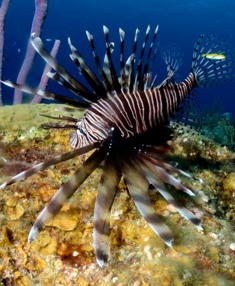Active conservaiton and leisure diving combine
 (CNS): Local dive operators and members of the Cayman Islands Tourism Association have introduced a new dive course for both residents and visitors to help in the fight against the invasive lionfish. The new one day PADI distinctive speciality course will enable those who pass through to become licensed culler of the species which is posing a real threat to local reefs. The 'Invasive Lionfish Tracker' educates divers about the Lionfish, including the essential facts about its progressive invasion of the North-western Atlantic and the Caribbean.
(CNS): Local dive operators and members of the Cayman Islands Tourism Association have introduced a new dive course for both residents and visitors to help in the fight against the invasive lionfish. The new one day PADI distinctive speciality course will enable those who pass through to become licensed culler of the species which is posing a real threat to local reefs. The 'Invasive Lionfish Tracker' educates divers about the Lionfish, including the essential facts about its progressive invasion of the North-western Atlantic and the Caribbean.
The course explains why action is required now to try and control the spiralling population and describes a practical way to safely and humanely capture and euthanize them.
Two dives are included in the course for practical application of the knowledge. Upon completion, students will be issued a new PADI c-card as well as a local culling license. Nets are used for capture in the course.
While no one can state categorically where the lionfish in the Caribbean came from, the best indication is that a handful of fish escaped from the aquarium trade, probably in south Florida or elsewhere along the eastern seaboard of the United States of America. With no effective local predators these few fish were able to establish a breeding population and the species invasion has spread from there.
Lionfish have followed currents up the East Coast of the United States and to Bermuda. After crossing the Gulf Stream to the Bahamas the fish expanded southward into the rest of the Caribbean, their eggs riding the currents westward to the Cayman Islands and now Central America.
While local dive professionals had been granted special permits issued by the Marine Conservation Board after completing a course offered by the Department of the Environment (DOE), it was not enough. The lionfish are both veracious eaters and rampant breeders, so the population continues to grow despite the dive industry and local resident divers’ attempts to cull the fish as fast as possible.
"Upon their arrival in Cayman we reached out to colleagues in REEF to see what could be done to assist in the regional data gathering efforts occurring at the time and to begin formulating any possible responses to their presence in Cayman waters. This has been an escalating response as the presence of lionfish has increased" stated Bradley Johnson of the Department of the Environment (DOE).
Jeni Chapman of Divetech brought the PADI Lionfish course to the attention of the DOE several months ago.
"The concept was to be able to get more people trained and licensed to capture lionfish, as we need all the help we can get. If all dive Instructors that teach courses every day could offer the Lionfish course, then we could recruit more help which would reduce some of the workload off of the DOE and enable the course to be offered every day of the year. Many visiting divers want to help so this allows them the option to do this," she said.
The challenge that was presented was that the Marine Parks Law does not permit the taking of anything, living or dead while on scuba, from the Cayman Islands waters. Before the course could be offered, it required approval from the DOE and the Marine Conservation Board to allow the course to be taught by local dive instructors.
The objective was that once a student passed the course, they could be issued the local Lionfish culling license. Following review, and with some inclusions from the local Marine Parks Laws, the course was approved.
"This was truly a collaborative effort in Cayman once again, with both public and private sector working together to address this threat. Both parties realized that fast response was needed and this new course will assist Cayman in its fight against the invasive lionfish," John Bothwell, Senior Research Officer of the DOE said.
Now any divers can contact their favourite dive operator and become part of the solution to help keep Cayman’s reefs healthy and balanced. Dive shops are also offering lion fish hunts as part of their regular schedule to assist in combating this problem for qualified divers. Many restaurants are now also offering lionfish in a variety of dishes.
Contact info@cita.ky for more information.
Category: Science and Nature

